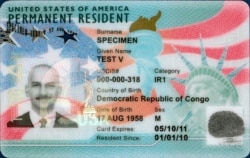Democratic lawmakers in the U.S. Congress introduced an immigration bill Thursday that would create an eight-year path to citizenship for millions of unauthorized immigrants in the U.S. while also providing a fast track to citizenship for those brought to the country illegally as children.
What does a path to U.S. citizenship look like under the U.S. Citizenship Act of 2021?
Under the bill, immigrants are eligible to apply for legalization if they were in the United States on or before January 1, 2021, pay all required fees and do not have a criminal record — although waivers would be available for certain nonviolent crimes.
There are special provisions for Temporary Protected Status holders, agricultural workers and those who arrived in the U.S. as minors, sometimes referred to as Dreamers.
"Having a criminal record or certain types of crimes on your record, or if you're a national security concern or issues about noncitizen smuggling, things like that, would serve to prevent you ... from getting relief under the bill,” Virginia immigration lawyer Hassan Ahmad told VOA.
The first step for applicants would be to secure lawful prospective immigrant status, or LPI, as a gateway to legal permanent residence in the United States. LPI status would be valid for six years, but immigrants would have to wait at least five years to apply for legal permanent residence, also known as green card status. They would be required to pass background checks and pay all taxes required by U.S. law.
After three years of green card status, an immigrant would be eligible to apply for U.S. citizenship.
Someone with LPI status could legally work and travel outside the U.S. and be lawfully admitted back into the country. Those going through the LPI process would be protected from deportation while the government is deciding their applications.
Does the bill cover people with valid nonimmigrant visas?
No. Those living temporarily in the United States or visiting the country would not be covered under the bill.
Are there any visa holders who could apply for LPI status?
Yes. LPI status could be granted to temporary agricultural workers (H-2A visa holders) and a “noncitizen who has engaged in essential critical infrastructure labor or services” in the United States, according to the text of the bill.
Which groups do not have to apply for LPI?
Those who qualify for Deferred Action for Childhood Arrivals (DACA) or who are already enrolled in the program, Temporary Protected Status holders and those who have been agricultural workers for at least five years will be able to apply directly for a green card, then wait five years to be eligible for U.S. citizenship.
What about criminal convictions?
Currently, dismissed or vacated convictions can still be considered by U.S. immigration courts.
“[The proposed bill] takes that out … so charges that were dismissed, immigration courts can't consider it anymore,” Ahmad said.
But the proposal excludes those who have committed three misdemeanors or were convicted of a felony. However, there are waivers available that would allow some immigrants to apply for LPI status if the crime had happened at least 10 years ago, or five years for misdemeanors, if the person does not have any new convictions.
What happens to family sponsorship?
The bill extends the V visa category — designed to keep families together during the immigration process — to families sponsored by a legal permanent resident, allowing them to come to the U.S. rather than waiting in their country of origin.
Currently, the V visa is available only to spouses and minor children of green card holders.
What about the three-year and 10-year bars?
Under current immigration law, those who stay in the country illegally for more than 180 days but less than one year are barred for three years from returning to the U.S. Those who are unlawfully present for more than one year are barred for 10 years.
The bill calls for eliminating the three- and 10-year bars on people who lived in the United States illegally and then left.
Does the bill help secure the U.S.-Mexico border?
The bill calls for “smart border controls” — deploying technology and additional law enforcement to secure America’s borders.






